With over 59,000 plugins in the WordPress directory alone, it can be hard to pick the right plugin for your website.
We’ve faced this problem firsthand when building and managing our own websites. Although we now have a trusted toolkit of plugins that we rely on, it took us a while at first to find the best options for our own business.
In this guide, we’ll share the exact process we use to pick plugins for our websites. This checklist is the same one trusted by our team and other WordPress experts to find reliable and effective plugins.
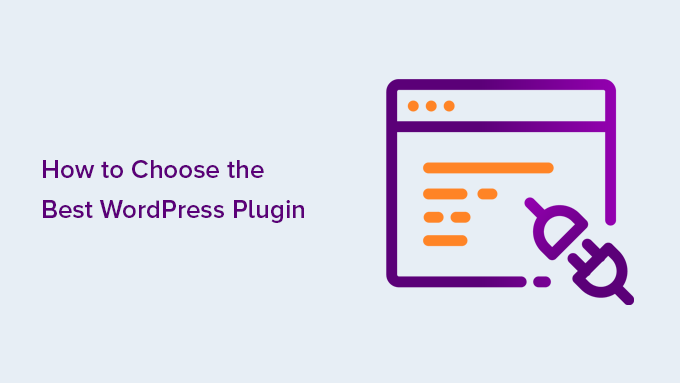
Disclaimer: While these factors won’t guarantee that you will pick the right plugin 100% of the time, they will definitely increase your chances of success.
Before You Start
Over the years, we’ve learned that the first step in choosing a plugin is to clearly define your needs. Start by writing down exactly what you want the plugin to do.
We recommend creating a checklist with the features you’re looking for, ranked in order of importance. This has always helped us focus on finding plugins that meet the most critical requirements first.
Sometimes, it’s impossible to find a single plugin that does everything. By prioritizing your must-have features, you’ll find it easier to narrow down your options and make the best decision.
Don’t worry if you need more than one plugin to achieve your goals. We’ve often combined plugins that work well together to get the desired results. The total number of plugins doesn’t matter as much as their quality and compatibility.
With that in mind, let’s explore how to choose the best WordPress plugin for your site.
How to Search For a Plugin
In our experience, the WordPress plugin directory is the best starting point when searching for plugins. With thousands of plugins available, it offers a wide variety of options, but the sheer abundance can make it tricky to find exactly what you need.
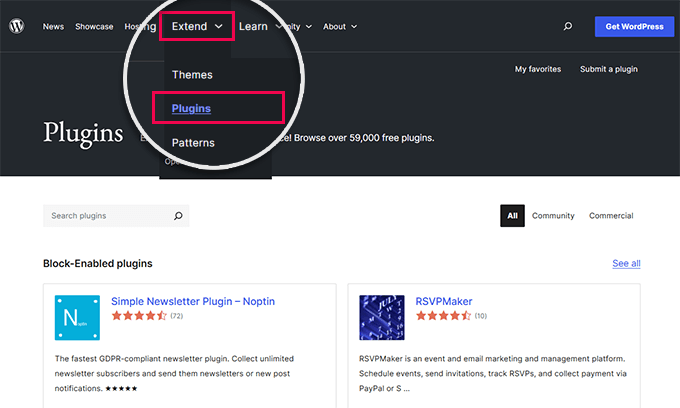
We’ve found that the search feature in the WordPress plugin directory can be limiting. That’s why we often turn to Google search or explore WPBeginner’s WordPress Plugins category for curated recommendations.
Another approach we recommend is browsing the most popular plugins in the directory. By checking the first two pages of popular options, we often discover reliable plugins that fit our needs. If nothing matches, then it’s time to run a specific search.
From our testing, the WordPress plugin directory search results are primarily based on relevance, which helps narrow down options effectively.
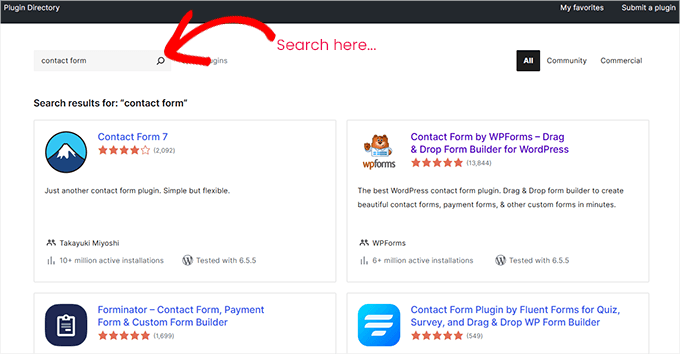
Each search result displays essential details like the plugin’s name, rating, description, number of active installs, author name, and compatibility with WordPress versions. These metrics have always helped us evaluate plugins quickly.
We recommend choosing plugins with a good number of active installs, strong ratings, and compatibility with a recent WordPress version. This combination has consistently worked well for us in ensuring quality and reliability.
💡Which WordPress Plugins Do We Use?
If you’re curious about the plugins we use, check out our Ultimate WordPress Toolkit. It’s a curated list of all the plugins we trust and use, along with detailed explanations of why we chose them. This toolkit is a great resource for anyone building or managing a WordPress website.
Find A Plugin From an Expert Picked Directory
As an alternative to plugin search, you can look at WPBeginner’s WordPress Solution Center.
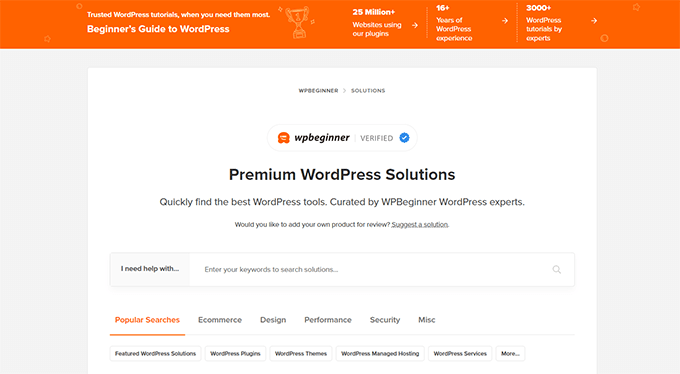
It is a curated directory of hand-picked WordPress plugins and tools. Our team of professional WordPress experts thoroughly tests and reviews each plugin on the list.
This saves you time as you can trust those plugins as the most reliable solutions.
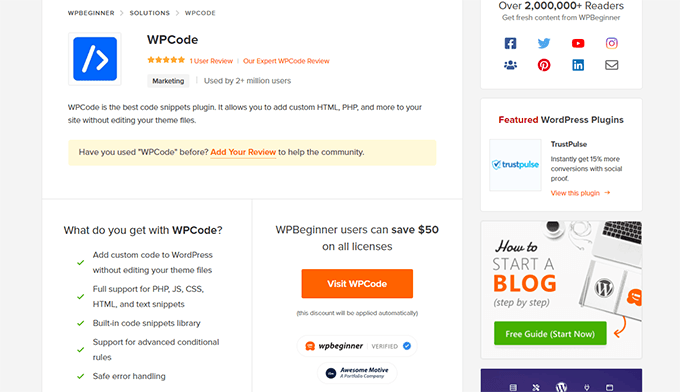
Plus, detailed reviews allow you to compare the pros and cons and see how the plugin would work with screenshots and step-by-step instructions.
Comparing Plugins – Which One Should You Download?
Once you have found a couple of plugins, you can open their pages in new tabs to compare them.
Each WordPress plugin page contains information about the plugin, what it does, how to use it, and more. You will need this information to decide whether this plugin is the best fit for your WordPress website.
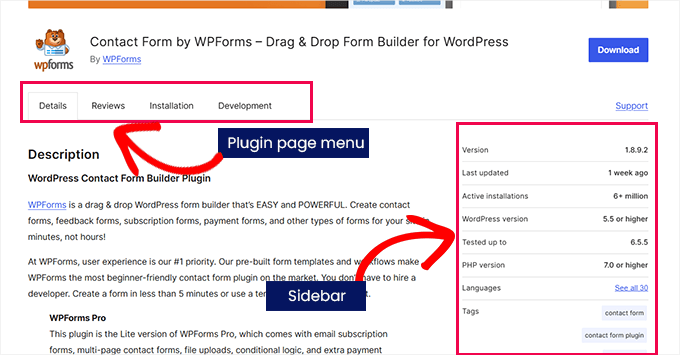
The sidebar on the plugin page contains valuable information, including the plugin version, the last updated date, active installations, and the minimum WordPress version required to run the plugin.
A plugin’s last updated date and active installs are good indicators of a plugin’s popularity.
This section will also show the tested up to WordPress version. If it doesn’t show the most recent version, then there is no need to freak out.
Although plugin authors check their plugins with each new WordPress release, they may only update the plugin if needed. Please see our article about installing plugins not tested with your WordPress version for more details.
Plugin Ratings
You can also see plugin ratings in the sidebar on the plugin page. The number of stars indicates a rating score, where 5 is the highest and 1 is the lowest.
You should keep in mind that many WordPress users use a plugin without rating it. A plugin downloaded by thousands of people may still not have many user ratings.
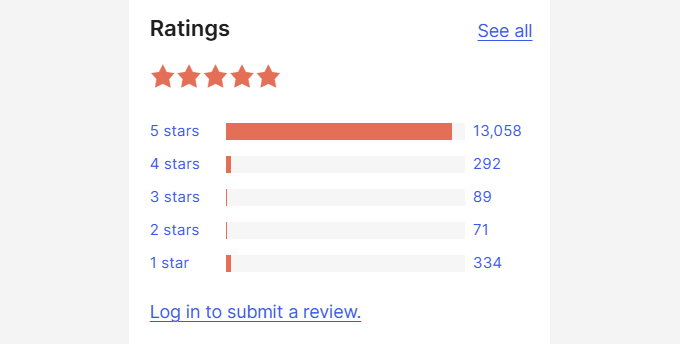
Plugin Reviews
When a user rates a plugin, they are asked to write a review along with their rating. You can see these reviews by clicking on the rating bars.
For example, if someone has given a plugin one star, then you can click on the 1-star link to read their review.
Another thing to notice here is the total number of ratings. For example, if a plugin only has one or two people rating it, then it is really not a significant number.
However, if those one or two people left a good reason for their rating in the review, then this would make their rating significant for others.
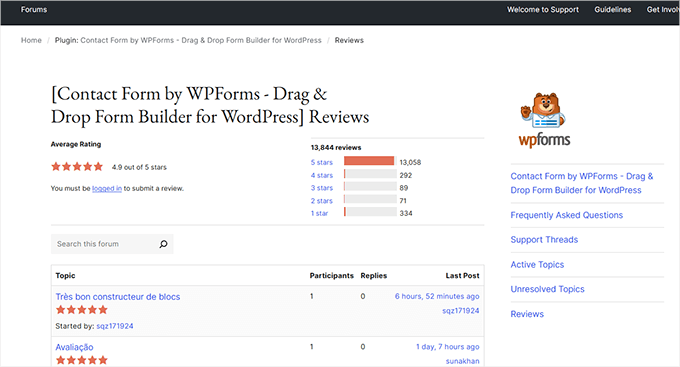
Support Overview
The support section of the plugin page’s sidebar will give you a quick overview of the number of support threads opened for a plugin during the last two months. It will also show you how many of these threads are resolved.
You can see support threads by clicking on the Support tab in the plugin menu bar. Just like the reviews, unresolved support threads don’t necessarily mean that the plugin has issues.
However, if a plugin has many unresolved threads and the author has not responded to any of them in the last two months, then this could mean that the author has lost interest. The plugin may still work for you but might not be supported in the long run.
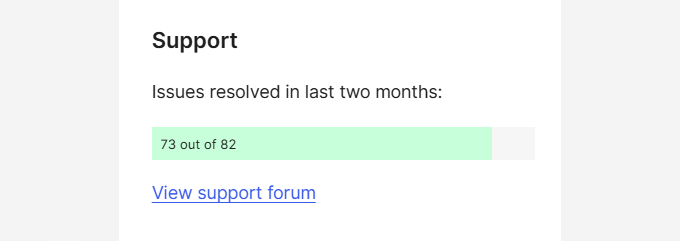
Plugin Screenshots
For most WordPress plugins in the directory, you will see a Screenshots section below the plugin description. Looking at plugin screenshots is a quick way to see how the plugin looks on the front and back end of your WordPress blog.
Sometimes, screenshots are more helpful than the actual plugin descriptions, which could be lengthy and confusing.
With screenshots, you can see how the plugin will look and what it does. In this way, you can quickly determine whether you should try it.
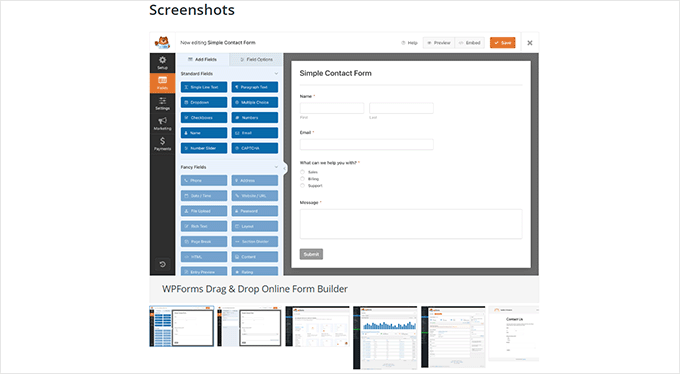
Check FAQs and Other Notes
Don’t forget to check the FAQs and Other Notes sections below the plugin description (some plugins may not have them).
These sections usually contain useful information about using the plugin. Sometimes, users complain that a plugin does not work without even reading about how to use it.
When you are trying a plugin, make sure you read these sections to configure and use the plugin properly on your website. You might also find some other excellent tips there.
For example, if you are looking for a plugin that adds a widget, you might find out that it also provides a template tag that you can use in your theme or a shortcode that you can use in posts and pages.
You may also see the plugin author’s advice on adding your own CSS styles to the plugin output.
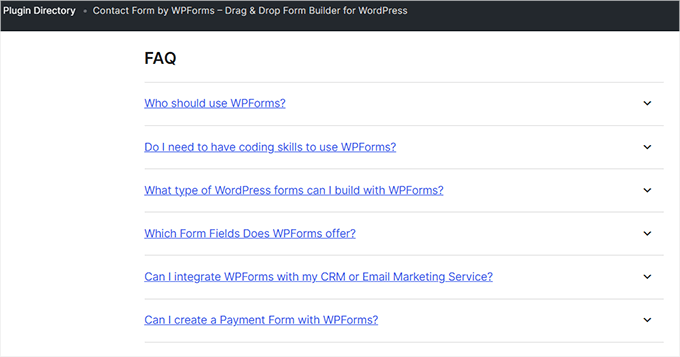
Testing a Plugin
WordPress plugins can slow down your website if poorly written or don’t follow WordPress coding standards.
To check for this problem, you can go to Pingdom or any other site speed-checking service. Test your website’s page speed before activating the plugin. Then, take screenshots or note down the results.
After that, go back to your WordPress website and activate the plugin. Now, test your website speed again.
If the plugin significantly slows your site’s speed, you should try finding a better plugin.
For example, in the screenshot below, you will see that a plugin has added an extra 0.8 seconds to our test site’s load time, making it significantly slower.
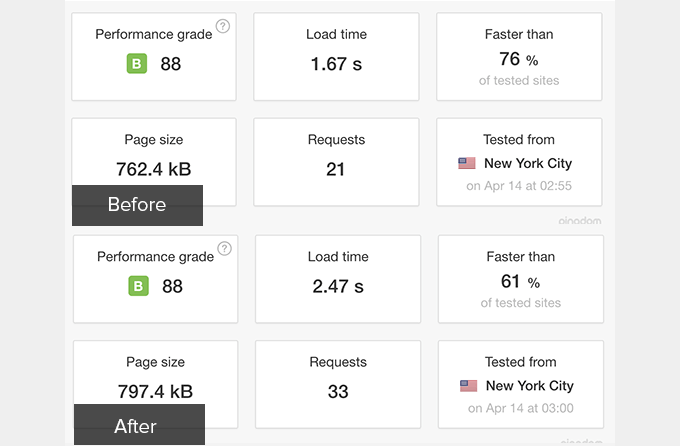
For more details, you can see our complete guide to WordPress speed and performance.
Expert Tip: Looking for a more interactive way to test a plugin without installing it on your website? Check out our tutorial on how to use WordPress Playground for more information.
Giving Back to the WordPress Community and Plugin Authors
WordPress is a free community software, as is the WordPress plugin directory. Plugin authors put much time, hard work, and creativity into writing those plugins.
You can help them in many ways:
- Donate: If you find a plugin useful and the author has a Donate URL on the plugin page, please consider donating some money. It is not the price of the plugin but a token of appreciation instead.
- Rate the plugin: As we mentioned, many users don’t feel inclined to rate a plugin that works well. You can help break this trend. When you find a plugin you like, consider leaving a rating and a review. A few lines are good enough to let people know about your experience with the plugin.
- Mention the plugin on your blog, Twitter, or Facebook.
What to Do When a Plugin Doesn’t Work
If a plugin creates an error or does not work, the first thing you should do is determine whether it conflicts with another plugin or WordPress theme.
You need to deactivate all other plugins and activate a default WordPress theme. Try testing the plugin again. If it still does not work, then you might want to open a support thread.
Visit the plugin’s page in the WordPress directory and click on the ‘Support’ tab. Scroll down till you find the support form and fill it out.
Remember that WordPress plugins are open source, which means that they come with no warranty and that the plugin authors are not required to answer your questions.
However, most plugin authors care about their code and will try their best to answer support questions whenever possible. You can check out our guide on how to properly ask and get WordPress support easily.
Bonus Resources
The following are a few additional resources that will help you use WordPress plugins more effectively:
- Do Inactive Plugins Slow Down WordPress? Should You Delete Them?
- How Many WordPress Plugins Should You Install? What’s too many?
- Is It Safe to Use Outdated WordPress Plugins? (Explained)
- How to Enable Automatic Updates for WordPress Plugins and Themes
We hope this guide helped you choose the best WordPress plugin. You may also want to see our expert pick of the essential WordPress plugins for every website and our guide on how to install a WordPress plugin.
If you liked this article, then please subscribe to our YouTube Channel for WordPress video tutorials. You can also find us on Twitter and Facebook.





Olaf
After many years of working with WordPress, I thankfully have a list of tried-and-true plugins. However, there are times when I need to find a new one. I usually rely heavily on the community for advice, asking in Facebook groups or on discussion forums. I’m interested in users’ real experiences. Once I narrow down the options to one or two plugins, I continue with a process similar to what you describe: checking ratings on wordpress.org, reviewing the plugin’s forum there, visiting the developer’s site, and checking the last update. It’s a fairly complex process, but the advantage is that you only have to do it once, because afterward, the plugin is on your trusted list and ready for use anytime.
Mrteesurez
Thanks for this guide, it’s a guidance to best choose a good plugin. For me when chosing a plugin, I firstly check the screenshot to see how it works in a glance, then active installation to know if more people are still using it, then then the comment and ratings to understand current users experience.
Dennis Muthomi
When I’m evaluating plugins, the first things I check are which WordPress version it’s been tested with and the last updated date. I want to ensure the developer is keeping the plugin updated as WordPress evolves.
So in addition to ratings and reviews, peeking at recent support threads can provide insight into a plugin’s quality and how responsive the developer(or the support team) is.
Mrteesurez
Thanks for the insight. I didn’t think of checking recent support threads, In fact it can provide good insight into a plugin’s developer support, if they are responsive or not. I appreciate this additional point you have shared.
Jiří Vaněk
Exactly as you say. The support forum is something that people usually visit only when they have a problem and expect help. I’ve learned to browse these forums before installation. There are two benefits to this approach. The first is that you can see what problems users typically encounter with the plugin. The second benefit is that you can easily observe how quickly the plugin’s support responds to requests for help. Usually, if the support is of high quality and responsive, I often overlook the fact that the plugin may not be tested with the latest version, because it’s clear that the developer cares for the plugin, and updates to new versions often come very quickly.
Dayo Olobayo
Thanks for sharing this article. I’ll ensure to check out WPBeginner’s curated directory of plugins. It’s always helpful to have a starting point when you’re looking for new plugins to add to your website. Thanks once again.
WPBeginner Support
You’re welcome!
Admin
Jiří Vaněk
This is a really great list of tips. Personally, when choosing a plugin, I always look primarily at which version it’s tested up to, when it was last updated, and occasionally I also check the support forum. However, the key aspects for me are mainly the first two, so I know the author is taking care of the plugin. I very rarely install a plugin that isn’t tested for the latest WordPress version. For that reason, I tend to prefer paid plugins in certain cases. There’s a greater assurance that the author will maintain it since it generates income for them.
Mrteesurez
I completely agree with your approach. I’ve also learned the hard way that using plugins not tested with the latest WordPress version can lead to compatibility issues and even security risks. I had a bad experience with an outdated plugin causing my site to crash after a WordPress update. Since then, I’ve prioritized regularly updated plugins, often opting for paid ones for the added peace of mind. Investing in reliable plugins has saved me from countless headaches.
Aqilah
Thank you for this article!
do I have to upgrade to the business plan to install any plugins?
WPBeginner Support
You would need a business plan on WordPress.com or you can use WordPress.org, we cover the differences in our guide below:
https://www.wpbeginner.com/beginners-guide/self-hosted-wordpress-org-vs-free-wordpress-com-infograph/
Admin
Your Real Name
Is wp Beginner only for self-hosted WP blogs? Is there a difference between available plug-ins for WP-hosted and self-hosted blogs?
WPBeginner Support
Yes, WPBeginner is a resource site for self-hosted WordPress websites. Please see our guide on the difference between self hosted WordPress.org vs free WordPress.com blog.
Admin
Kay
I’ve had a really hard time finding good plugins and getting support (especially from pro/paid plugins). I’m super frustrated with it because there’s really nowhere to get help short of hiring someone and paying high fees I can’t afford (hence the reasons I’m learning to build my own site). I was hoping to sort them by rating but according to you this isn’t going to be a good way to go because I’ll get a bunch of unrelated options. But if I did want to try to sort through it by highest rating how would I do that because I don’t see this option in the site.
Thanks
WPBeginner Support
Support is always concern for many WordPress users. We would recommend you to take a look at our Showcase section. We have some lists of our favorite WordPress plugins that you might find helpful.
Admin
WPBeginner Staff
You need to install plugins from reliable sources only. If there is a security vulnerability in a plugin, then there is a good chance that it will be caught and resolved quickly. However, there are some best practices that you should follow when installing new plugins. Checkout our guide on how to choose the best WordPress plugins.
Don
I’m building my first website in WP, thus attempting to garner all helpful ‘how to’s.’ I find it very tempting in WP to select various plugins; however, street buzz indicates that plugins make it easy for hackers to penetrate a website. What is WPBeginner’s position on this issue?
Sunil Kumar
Yes, it’s a good to do some research before picking any
plugin for our blog. I think reading users review on the plugin is a one of the best practice. Thank for sharing these points.
Greg Jones
Is it valid to compare a ping from Dallas with one from the Netherlands?
Max
no, not at all, I saw up to a 3 seconds difference from Amsterdam to Dallas and NY before “cleaning” my site;
but a 10 queries difference is noteworthy nevertheless